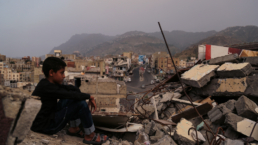Proponents have passed similar bills before, but this time they’ll have to contend with a White House striving to rekindle relations with Saudi Arabia.
By Sara Sirota, The Intercept
More than seven years have passed since Yemen’s Houthi rebels leveraged popular frustration over fuel prices to oust the government of President Abdrabbuh Mansur Hadi. That was a troubling development for Saudi Arabia, which had allied with the overthrown leadership to secure access to a key oil shipping lane off Yemen’s coast. The prospect that a movement purportedly backed by regional foe Iran would control this waterway was unconscionable, so the oil kingdom convened an international coalition, under the leadership of then-Saudi Defense Minister Mohammed bin Salman, now the crown prince, that could suffocate the insurgents. With the support of the United States, Saudi Arabia established a devastating port blockade that slashed the flow of commercial and humanitarian goods into Yemen and littered the country with bombs that have killed countless civilians.
During the Trump administration, some Democrats, joined by a handful of Republicans, fought to end the U.S. bomb sales, intelligence support, and warplane refueling that made the Saudi intervention possible. But with a Riyadh-friendly president in the White House, their efforts never had a plausible chance of actually forcing the kingdom to withdraw. Democrats at the time didn’t bear responsibility for managing relations with a major weapons customer and oil producer that helped keep gas prices low at home. In early 2019, when majorities in both the House of Representatives and Senate for the first time in history invoked the 1973 War Powers Resolution to end U.S. involvement, Saudi Arabia could rely on former President Donald Trump’s veto.

So the war dragged on. President Joe Biden adjusted U.S. policy when he entered office by demanding an end to “offensive” support, but this didn’t have a material impact for Yemenis trapped by the blockade and Saudi air raids supporting it. In November, the United Nations estimated that 377,000 Yemenis would be dead by the end of 2021, 70 percent of whom would be children, many as a result of starvation and disease. According to the World Food Programme, more than 17 million Yemenis are battling food insecurity, and that figure is expected to rise to 19 million, or nearly one-third of the population, by December 2022. Two months ago, the U.N. brokered a cease-fire between Saudi Arabia and the Houthis that gave the population some respite, but it’s scheduled to end this week. Numerous aid groups are calling for an extension.
Recent Posts
President Trump Poses With Sen. Graham And A ‘Make Iran Great Again’ Hat
January 6, 2026
Take Action Now “It’s not politically correct to use the term, ‘Regime Change,’ but if the current Iranian Regime is unable to MAKE IRAN GREAT AGAIN,…
ICE Plots $100 Million ‘Wartime Recruitment’ Drive Aimed At Hiring Gun Enthusiasts
January 6, 2026
Take Action Now The propaganda blitz will be aimed at “people who have attended UFC fights, listened to patriotic podcasts, or shown an interest in…
Meet Paul Singer, the Billionaire Trump Megadonor Set To Make A Killing On Venezuela Oil
January 6, 2026
Take Action Now “Paul Singer’s shady purchase of Citgo has everything to do with this coup.”By Stephen Prager, Common Dreams One of President…
Maduro Abducted
January 5, 2026
Take Action Now Trump’s lawlessness overseas will accelerate his lawlessness at homeBy Peter Beinart, The Beinart Notebook Transcript So the news…




